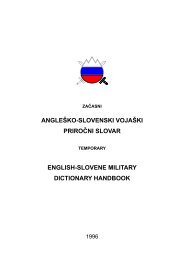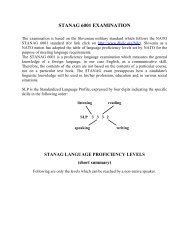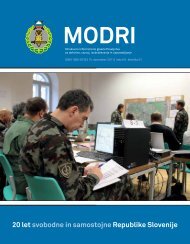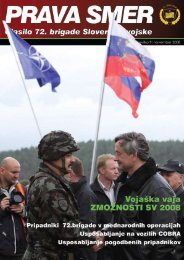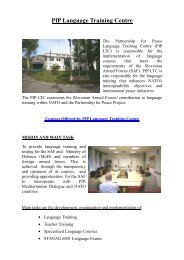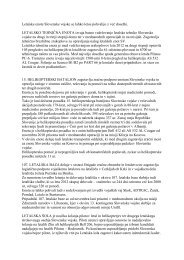Letnik 9/2, september 2007 - Slovenska vojska
Letnik 9/2, september 2007 - Slovenska vojska
Letnik 9/2, september 2007 - Slovenska vojska
Create successful ePaper yourself
Turn your PDF publications into a flip-book with our unique Google optimized e-Paper software.
Denis Čaleta<br />
terrorism” which is even more lethal and difficult to control than terrorism we got<br />
used to in the near and more distant past It is obvious that modern terrorism is in<br />
close correlation with the process of globalisation and that it exploits all influences<br />
which this process brings in the 21st century. Also in the past one could not connect<br />
terrorism only with one religion or socio-political system. Terrorism has been<br />
connected with different activities of persons and organizations which operated<br />
in a certain closed region. Terrorism is these days in terms of its dimensions<br />
international and transnational and this means that national borders have lost their<br />
traditional meaning. Terrorist targets, even if connected only with one state, could<br />
be found anywhere in the world 2 . Attacks performed by the international terrorist<br />
network on selected targets in the most industrially and militarily developed<br />
state had a very deep message and symbolic meaning. Threats brought by global<br />
terrorism are possible any time and any place in the world. There is no total<br />
security and it is impossible to ensure it. This recognition has been even stronger in<br />
our minds after terrorist attacks on the USA, Madrid, Beslan and London.<br />
It is very important that after the Cold War, violence has become a legitimate part<br />
of this system in international relations. States and international organizations try<br />
to keep their monopoly over the execution of violence. In view of new global force<br />
proportion it is justified to ask ourselves if the role of states in this area is reducing<br />
because lately more and more non-state actors appear which seem to be directly<br />
collaborating in arranging international relations. A large increase in the number of<br />
non-state actors and their clear wish to directly cooperate in settling international<br />
relations evidently present a certain “threat” to states and their monopoly over<br />
executing violence. Based on a concrete relationship between the globalisation of<br />
terrorism and terrorist groups on the one side and the role of the state on the other<br />
side we can’t with all certainty confirm essential reduction of its role in international<br />
relations. On the one hand, international terrorist organizations still have certain<br />
direct or indirect support by some states. 3 A very important dimension of modern<br />
terrorism is also the changes in motivation patterns of terrorists. On the scene, there<br />
is a new wave of terrorists who are joining in the network structures composed of<br />
groups of ready and highly motivated individuals with religious persuasion and<br />
pervaded with religious hatred. The second important group of terrorists is violent<br />
right wing extremists and various sects who believe in apocalypse or the end of the<br />
2<br />
As an example, the most evident are the attacks on the USA and Israeli embassies and other facilities<br />
3<br />
The supporters of terrorism are considered to be the states whose ideological and political framework<br />
is in accordance with goals of terrorist organizations.<br />
129




